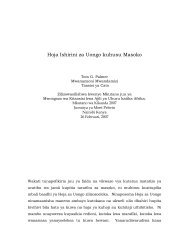Preventing Electoral Fraud report SAIRR May 11 ... - AfricanLiberty.org
Preventing Electoral Fraud report SAIRR May 11 ... - AfricanLiberty.org
Preventing Electoral Fraud report SAIRR May 11 ... - AfricanLiberty.org
You also want an ePaper? Increase the reach of your titles
YUMPU automatically turns print PDFs into web optimized ePapers that Google loves.
It is easy to feel that making recommendations on how to improve democracy is the same<br />
– that this will work when governments want them to but not when they seek to<br />
undermine the recommended measures. It is an easy step from this to conclude that trying<br />
to improve democracy in Zimbabwe is a chicken-and-egg situation; that it cannot really<br />
be done until a properly democratic government is in power; and that the Zanu-PF regime<br />
will always frustrate the chances of such a government coming to power. If that is a<br />
logically watertight proposition then making such recommendations – this Report<br />
included – is just a waste of time.<br />
It is true that no one ever lost money by betting on Zanu-PF's determination to retain<br />
power but such a perspective misses the important historical nuances in Zimbabwe's<br />
situation. The present Government came to power in the 1980 election, and it was<br />
important to it to insist that this gave it genuine democratic authority. Thus it has held<br />
regular elections ever since and Mr Mugabe's singular attempt to install one-party rule<br />
and do away with elections was heavily voted down by his own party. For the fact is that<br />
it has become increasingly necessary to national self-respect for African governments to<br />
point to their democratic legitimacy. The era of military coups is over and however weak<br />
and vacillating the AU may be in other directions, it is now tough and unequivocal in<br />
condemning each and every military coup and demanding immediate democratic<br />
elections. This is also the attitude of (most of) the Great Powers and all hope of donor aid<br />
depends on at least a semblance of democracy.<br />
In Zimbabwe's case, such forces have transformed the neighbourhood. When Zanu-PF<br />
came to power, Zambia and Malawi were one-party states, Namibia and South Africa<br />
were under white minority control, and there had been no multi-party elections in Angola<br />
or Mozambique. Today everything has changed and all Zimbabwe's SADC neighbours<br />
are at least nominal democracies. This has made a vast difference. It was in 1989-90 that<br />
Mr Mugabe made his proposal for a one-party state. It was heavily defeated even then<br />
and it would be unthinkable to propose it now. Those days have simply long gone. So far<br />
has the tide gone out on such things that it is startling to realise that the man who<br />
proposed a one-party state in Zimbabwe is still in power when the other local architects<br />
of one-party states – Hastings Banda, Kenneth Kaunda, Samora Machel and Agostinho<br />
Neto – have long departed the scene. Mr Mugabe himself is now 87. It is important to<br />
realise that while he may remembered as a man who for long acted as Canute, that is all<br />
he can be. The democratic tide is coming in and it is a matter of time before Zimbabwe<br />
joins its neighbours in this development.<br />
Moreover, this development seems far more certain in Zimbabwe – with its pre-Mugabe<br />
tradition of multi-partyism, its strong opposition and vigorous civil society – than it ever<br />
did in most of the surrounding countries. In addition, even under Mr Mugabe, there has<br />
been movement. In the early days opposition parties were hardly tolerated at all and even<br />
when the MDC was formed many voices within Zanu-PF – Mr Didymus Mutasa was a<br />
leading example – argued that all differences and questions should have remained within<br />
Zanu-PF and there should never have been a separate opposition party. Gradually,<br />
however, Zanu-PF has had to acknowledge that the Opposition exists, that it has<br />
legitimacy, and even that it should provide a Vice President and Prime Minister.<br />
21



